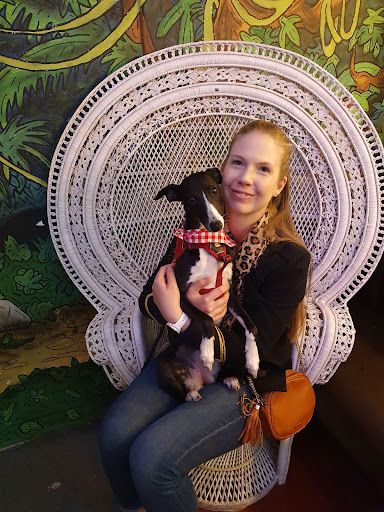A Whippet’s Separation Story
How do you know that your puppy has separation anxiety? There is unfortunately a lot of contradicting and outdated advice on what to do if your puppy does not seem to like it when left alone (spoiler alert: do not let them cry out). When our puppy showed signs of distress when left alone, even for a few seconds, my husband and I searched for advice and explanations online. We read pages upon pages of websites and blogs, searched for information in various online groups and watched several youtube videos; all in the hope of finding a solution.
Having a brand new puppy is already a challenging task, but having one with separation anxiety can make you feel trapped in your own home. It makes you feel like you sacrificed everything for your dog, you can’t nip to the shops, see friends or go to the cinema. You cannot do anything that would offer some emotional escape from the furball constantly crying, biting and pooping. In addition to this, society labels these dogs and faults their owners (letting the dog sleep on the bed, cuddling the dog etc) which makes it even more difficult to reach out for help.
Finding professional help
The turning point for us was after one evening of me breaking down in tears on the hallway rug, my husband purchasing Julie Naismith’s book Be Right Back. After reading the book and joining the online group, we started separation training in January 2021 using Julie’s training regime. We followed every piece of advice and training plan in the book, but our puppy seemed to always be a step ahead of us. She did not ‘follow’ the dog patterns in the book, and her reaction to separation did not improve. We came to realise that we had underappreciated how many tricks a 6 month old puppy has up her sleeve. We needed professional help.
Julie’s website lists a few accredited separation anxiety trainers, and this is how we found River. We wanted to make sure that we got a trainer with the right mentality, and proper separation anxiety training experience. Also, the cost of a behaviourist with appropriate qualifications might be reclaimable under insurance (worth checking the T&Cs!). We started working with River in April 2021 and never looked back. River’s eye for detail ensured that my husband and I felt we were in safe hands, expertly guided through the whole process. After the initial consultation, River set up a daily training plan for us with templates to fill in and a folder to upload training videos.
Considering Medication
However, Makya had different plans for us all. We came to learn she is highly ‘operant’ and along with feeling worried, had developed a huge repertoire of tactics to make us stay. She aced some training days, then regressed some weeks. She did not have a consistent behaviour patterns, or an easy-to-read baseline where her anxiety was concerned. After we have amended all our leaving tactics and schedules and still did not see continuous progress over 3 months of committed training, River suggested for us to consider medication.
I have to admit, we were quite nervous about medicating Makya. We did not want her to lose her personality and become a zombie dog. She also had a lot of tummy issues as a puppy, so we were cautious in case there were any side effects. It also felt like an easy way out, a bit of laziness, medicating our furry child. We had long discussions with River and our vet, and read up on the proposed medication online. River got in touch with our vet to discuss Makya’s medication plan in detail. First, as a test, we started with a situational calming medicine, trazadone, which proved to be a huge success. With careful dosage, Makya did not lose her cheeky whippetynesstm, her desire to run and play, or to cuddle with us in front of the TV. It had a huge effect on the training too which made us question why we were so against medications before. She kept her temperament, but became calmer overall. We had to realise that she might have always been a bit on edge, and finally we experienced how it feels to have a dog who is able to just chill on the sofa.
Finding the right medication to help
As the first medicine was only planned to be short term (to test if medication would help the SA training) the vet proposed a different type of medication, an SSRI called fluoxetine which would take time to build up in her body and have a longer term, more balanced effect. I will not lie, we did struggle with this medication a lot. We knew that dogs taking this medication might lose their appetite and be more sleepy, but it was heartbreaking seeing Makya just sleeping the whole day. She did not want to play, eat or go on walks. She just wanted to sleep. It took her almost 8-10 weeks to start getting back to herself. The medication had not settled in her yet, so the daily separation training did not show great results. She is already skinny and a fussy eater, so the vet had to weigh her quite often to make sure she does not lose too much weight during those first 2 months. As she was not motivated by food (not even by her favourite snacks), and did not want to play, her enrichment and training became non-existent too. She did not want her puzzle feeders or snuffle mat and ignored her favourite chews, even losing engagement with the agility training she loves. . It was a very stressful time for us.
However, after the medication settled in, her separation training progressed rapidly. We started with baby steps, but soon managed to leave her for 30 mins while she was napping on the sofa. Even if she comes to the front door, she does not scratch or whine continuously. As we write this blog we are able to put on our jackets and shoes, walk down 3 flights of stairs and leave our building, slamming all the doors as we go (we don’t but we could, Makya at least wouldn’t care). We’re still a little way from being able to get ready and go out for a romantic dinner or leave for long enough to enjoy a trip to the cinema, but these things feel within our grasp; giving us the energy to keep on working towards them.
Such positivity would not be possible without the tremendous work that River has done helping us to train Makya as well as supporting us on what has been a difficult journey.




